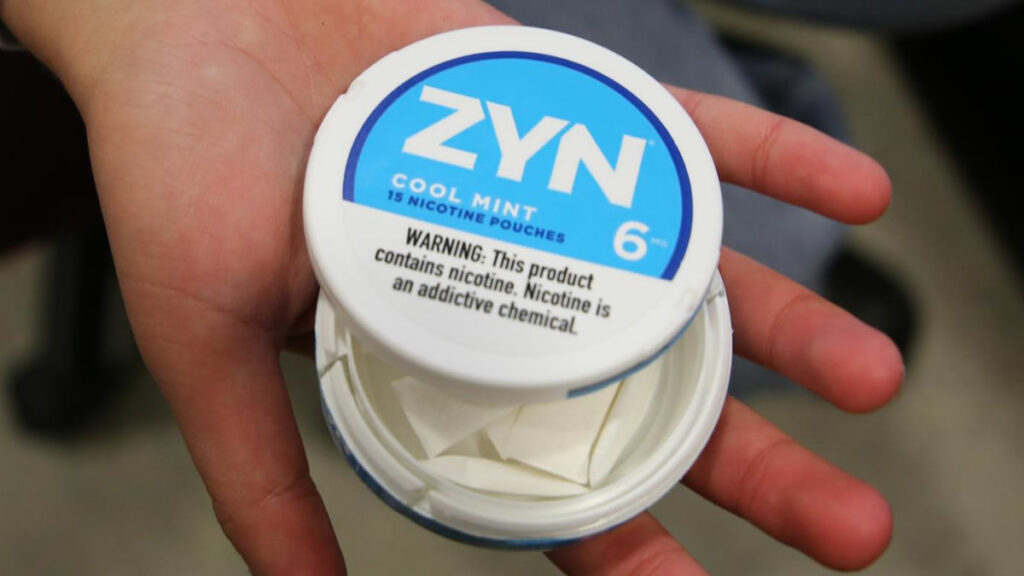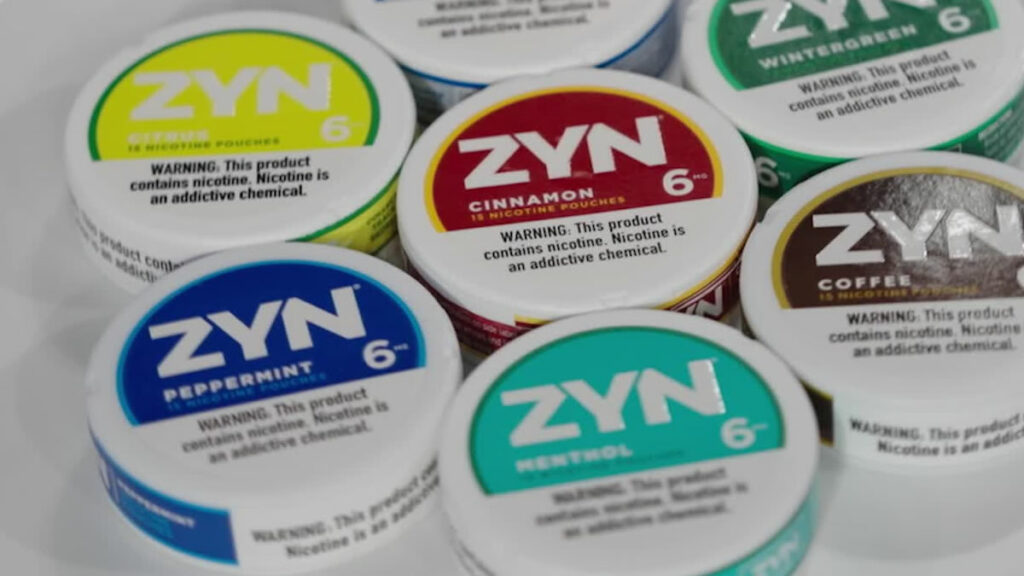In-depth look at Zyn nicotine pouch safety: FDA authorization, health risks (addiction, oral health), youth appeal & comparison to smoking.
Nicotine pouches, with Zyn leading the charge in popularity, have rapidly established themselves as a significant new category in the nicotine and tobacco landscape. These small, discreet, tobacco-leaf-free microfiber pockets, filled with nicotine powder (either tobacco-derived or synthetic) and various flavorings, are designed to be tucked between the user’s gum and cheek, delivering nicotine without smoke or spit. As their use, particularly among young adults and even teens, continues to surge, the question on many minds is: Is Zyn safe?
This guide delves into what you need to know about nicotine pouches, their regulatory status, potential health risks, and the ongoing debate surrounding their role in public health.
What are Nicotine Pouches and Who is Using Them?
Nicotine pouches like Zyn, marketed by Swedish Match North America (owned by Philip Morris International), represent a modern evolution in oral nicotine delivery. They are distinct from traditional smokeless tobacco products like snus or chewing tobacco because they do not contain actual tobacco leaf. Instead, they deliver nicotine, flavorings, and fillers. Sold in small cans, typically containing 15-20 pouches, for around $6, they come in various flavors and nicotine strengths, commonly 3mg and 6mg per pouch.

Their popularity has skyrocketed. In the first quarter of 2025, Zyn shipments reportedly increased by 53% compared to 2024, according to Philip Morris. This growth is visible across diverse demographics, from young professionals on Wall Street to attendees at Zyn-sponsored concerts, raising significant public health concerns. The FDA’s 2024 National Youth Tobacco Survey (NYTS) identified nicotine pouches as the second most commonly used tobacco product among middle and high school students, with 1.8% reporting current use, a slight increase from 2023. Some studies indicate high school students’ use of these products nearly doubled from 2023 to 2024, and sales have continued their steep upward climb1.
Elise Stevens, an assistant professor at UMass Chan Medical School, points to the product’s inherent design – easy to use, very discreet, and packaged in small, colorful tins – as a key factor in its appeal to young people. “This can be something that is really appealing to young people because it can be hidden from teachers or from others in places where you’re not supposed to smoke or vape,” Stevens noted.
Regulatory Landscape: FDA Authorization and Marketing Restrictions
In a significant regulatory development, the U.S. Food and Drug Administration (FDA) authorized the marketing of 20 Zyn nicotine pouch products in January 2025 through its Premarket Tobacco Product Application (PMTA) pathway2. This marked the first time the agency had granted marketing orders for nicotine pouches.
The FDA’s decision was based on an extensive scientific review, which concluded that these specific Zyn products contain substantially lower amounts of harmful and potentially harmful constituents (HPHCs) compared to cigarettes and most traditional smokeless tobacco products like moist snuff. The agency determined that authorizing these products was “appropriate for the protection of public health” because, among other factors, the available evidence suggested that exclusive users of Zyn would be exposed to fewer HPHCs, potentially reducing their risk of tobacco-related diseases like cancer compared to cigarette smokers2.
However, it is crucial to understand that FDA authorization is not an endorsement of safety, nor does it mean the products are “FDA approved” in the way pharmaceuticals are. The authorization simply means the products can be legally marketed in the U.S. under specific conditions. The FDA emphasized that these products are intended for adult nicotine users aged 21 and older and are not safe for use by youth or individuals who do not currently use tobacco products2.
To mitigate youth appeal and access, the FDA imposed stringent marketing restrictions on the authorized Zyn products, including:
- A ban on mass-market advertising on radio or television.
- Requirements that actors and models appearing in advertisements must be at least 35 years old or styled to appear so.
- Prohibitions on content specifically targeting youth.
The FDA stated it will continue to monitor youth initiation rates and other data, reserving the right to suspend or withdraw marketing authorization if usage among young people significantly increases or if other public health concerns emerge.

Are Nicotine Pouches Bad for You? Unpacking the Health Risks
While Zyn and similar nicotine pouches are tobacco-leaf-free and do not involve combustion (the primary source of harm in cigarettes), they are not without significant health risks. The “resounding yes” from many doctors and public health officials when asked if they are bad for you stems largely from the presence of nicotine and other potential chemical exposures.
Nicotine Addiction: A Primary Concern
Nicotine, in any form, is a highly addictive substance. Dr. Sharon Levy, chief of the Division of Addiction Medicine at Boston Children’s Hospital, emphasizes that products delivering nicotine to the brain quickly and at high concentrations are the most addictive. Nicotine pouches, with strengths like 3mg and 6mg per pouch, can deliver a potent dose, making them a “very addictive form,” especially for children, adolescents, and young adults whose brains are more susceptible to developing addiction. The American Lung Association noted that 400,000 U.S. youth reported current use of nicotine pouches in 2023, a figure that had doubled since 20211, highlighting the risk of a new generation becoming dependent on nicotine through these products.
Cardiovascular Effects
Nicotine is a stimulant that can negatively impact the cardiovascular system. It can cause an increase in heart rate and blood pressure. Harvard Public Health experts note that while potentially less risky than smoking for existing smokers, nicotine pouches can still pose cardiovascular risks, particularly for non-users who might initiate nicotine use with these products3.
Oral Health Problems
The direct and prolonged contact of the pouch with the gums and oral mucosa raises concerns about oral health. Dentists and oral health experts warn of potential issues such as4:
- Gum irritation and soreness
- Gum recession (where the gum tissue pulls away from the teeth)
- Increased risk of cavities or other dental problems due to changes in the oral environment.
Dr. Varisha Parikh, a dentist, has warned about the potential for gum recession and other dental issues from prolonged exposure to the chemicals in these pouches.
Gastrointestinal Issues
Some users report gastrointestinal symptoms when using nicotine pouches. Dr. Donna Shelley, a professor at NYU School of Global Public Health, mentioned that users might experience nausea, and there are concerns about potential links to ulcers. Swallowing nicotine-laden saliva can also contribute to these issues.
Chemical Composition and Other Potential Harms
While Zyn pouches are tobacco-leaf-free, they still contain other chemicals besides nicotine. A 2023 study published in BMC Chemistry found that Zyn products contain formaldehyde, a chemical classified as potentially harmful by the FDA, although they notably lack the tobacco-specific nitrosamines (TSNAs) found in traditional smokeless tobacco and cigarettes5. Another 2022 analysis by the American Lung Association reportedly found various cancer-causing chemicals and other harmful substances like ammonia, chromium, and nickel in 26 out of 44 tested nicotine pouch products, including some Zyn variants6.
While a Philip Morris spokesperson pointed out the FDA’s stance that many serious health concerns from tobacco stem from smoke rather than nicotine itself, the presence of other chemicals and the addictive nature of nicotine in pouches remain significant concerns for health experts. Researchers have also linked general nicotine use (not specific to pouches) to potential damage to the lungs and stomach, and a decreased ability for the body to fight diseases and infections.

Harm Reduction vs. Gateway Product: The Ongoing Debate
One of the central debates surrounding nicotine pouches like Zyn is their role in public health. Can they be a valuable harm reduction tool for adult smokers, or are they primarily acting as a gateway to nicotine addiction for youth and non-smokers?
The FDA’s authorization of Zyn was partly based on the premise that they could offer a less harmful alternative for adult smokers who switch completely. Dr. Sharon Levy acknowledged that for older adults already addicted to nicotine from cigarettes, pouches could provide an alternative to move away from the severe harms of smoking, though she stressed this is harm reduction, not a treatment for substance use disorder.
However, the significant uptake by youth is a major counter-argument. The discreet nature, appealing flavors (where available), and aggressive marketing, often amplified by “Zynfluencers” on social media platforms like TikTok4, make these products particularly attractive to young people who have never used tobacco. Public health organizations like Truth Initiative7 and experts from Johns Hopkins University8 and Yale Medicine9 express deep concern about this trend, fearing that nicotine pouches are creating new nicotine dependencies rather than solely helping existing smokers quit.
Furthermore, for individuals considering Zyn as a smoking cessation tool, experts like those at WebMD caution that it is not an FDA-approved nicotine replacement therapy (NRT) like nicotine gum, patches, or lozenges10. There is currently no robust clinical trial data demonstrating Zyn as a safe or effective way to quit smoking. Adults looking to quit smoking are advised to consult healthcare professionals about evidence-based cessation strategies and FDA-approved NRTs.
Conclusion: A Less Harmful Alternative, But Far From Risk-Free
Nicotine pouches like Zyn occupy a complex space in the current public health landscape. The FDA’s marketing authorization for specific Zyn products acknowledges their potential to be significantly less harmful than combustible cigarettes for adult smokers who switch completely. They eliminate exposure to the myriad toxins produced by burning tobacco.
However, “less harmful” is not synonymous with “safe.” Zyn and other nicotine pouches still deliver highly addictive nicotine and contain other chemicals whose long-term health effects are not fully understood. The potential for cardiovascular issues, oral health problems, gastrointestinal distress, and, most critically, the high risk of initiating nicotine addiction, especially among youth who have never used tobacco, are serious concerns voiced by a broad spectrum of health professionals and organizations.
The rapid rise in youth usage, fueled by discreet product design and social media trends, presents a significant public health challenge. While the FDA has imposed marketing restrictions, ongoing vigilance and further research are essential. For adult smokers seeking alternatives, nicotine pouches may offer a reduction in harm compared to continued smoking, but they should not be viewed as a risk-free product or an FDA-approved cessation aid. Individuals, particularly non-tobacco users and young people, should avoid these products due to their addictive nature and potential health consequences.
- Florida Proposes Public Smoking Ban: HB 389 Details - February 10, 2026
- Baden-Württemberg Expands Smoking & Vaping Bans: New Locations & Fines - February 5, 2026
- South Korea Classifies E-Cigarettes as Tobacco: New Rules April 24 - February 4, 2026
- American Lung Association – Zyn 101: What to Know About Big Tobacco’s Latest Addiction[↩][↩]
- FDA News & Events – FDA Authorizes Marketing of 20 Zyn Nicotine Pouch Products After Extensive Scientific Review[↩][↩][↩]
- Harvard T.H. Chan School of Public Health – Zyn pouches safer than smoking, but still pose risks[↩]
- NBC News – The dark side of Zyn: How tobacco-free nicotine pouches may harm[↩][↩]
- BMC Chemistry – Chemical characterization of ZYN nicotine pouches[↩]
- Scientific American – The Health Effects of FDA-Authorized ZYN Nicotine Pouches[↩]
- Truth Initiative – What is Zyn and what are oral nicotine pouches?[↩]
- Johns Hopkins University Hub – Nicotine pouches are growing in popularity. Are they safe?[↩]
- Yale Medicine – What Parents Should Know About Nicotine Pouches[↩]
- WebMD – Nicotine Pouches: Use, Benefits, and Risks[↩]


